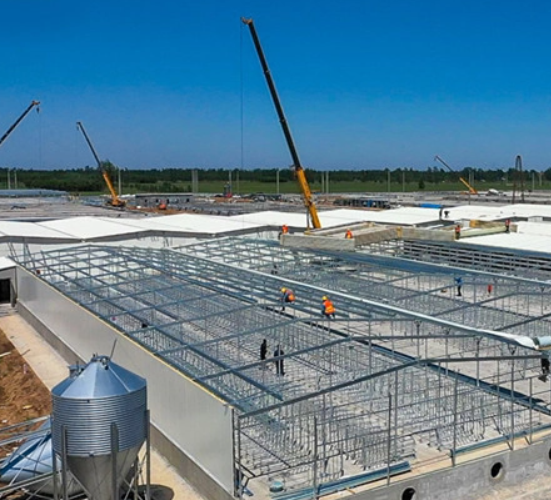
Modular Cow Barns: Efficient, Durable, and Scalable Solutions for Dairy and Beef Farms
Modern livestock farming requires barns that ensure the safety, comfort, and productivity of animals while being cost-effective and easy to maintain. Traditional wooden or brick barns are often time-consuming to construct, expensive to maintain, and inflexible for farm expansion.
Modular cow barns provide a modern solution by combining prefabrication, scalability, and durable materials to support both dairy and beef farming operations. This article explores the advantages, design considerations, and applications of modular cow barns for B2B clients in the livestock industry.
What Are Modular Cow Barns?
Modular cow barns are prefabricated buildings constructed from steel frames, insulated panels, and roofing components. Factory production ensures consistent quality, and on-site assembly allows rapid deployment.
Unlike traditional barns, modular cow barns can be customized in layout, stall size, and amenities such as milking stations, feeding zones, and storage areas. The modular approach allows expansion without disrupting ongoing farm operations.
Key Advantages of Modular Cow Barns
- Rapid Deployment
Prefabricated modules reduce construction time significantly. Farms can have operational barns within weeks rather than months, supporting faster herd management and production. - Durability and Longevity
Steel frames resist pests, rot, fire, and extreme weather, ensuring barns remain functional and safe for decades. - Low Maintenance
Prefabricated panels, steel structures, and durable roofing minimize upkeep, reducing labor and material costs. - Customizable Layouts
Modular cow barns allow flexible arrangements of stalls, feeding areas, milking stations, and storage. Layouts can be adapted to herd size and farm operations. - Ventilation and Climate Control
Proper airflow and insulation maintain stable temperatures and reduce stress on livestock, improving health and productivity. - Scalability
Modular barns can be expanded by adding additional modules as herd size increases, without interrupting existing operations. - Sustainability
Steel is recyclable, and prefabrication reduces construction waste. Energy-efficient insulation supports environmentally conscious farming practices.
Design Considerations for Dairy and Beef Farms
B2B clients should consider:
- Stall Size and Configuration: Ensure adequate space for cow comfort and movement.
- Ventilation and Lighting: Maximize natural light and airflow to improve animal welfare.
- Feeding and Water Access: Optimize placement for operational efficiency and minimal labor.
- Flooring and Drainage: Non-slip floors and proper drainage ensure hygiene and safety.
- Future Expansion: Modular designs should allow additional units without disrupting operations.
Applications Across Livestock Operations
Modular cow barns are suitable for:
- Dairy Farms: Integrated milking stations and feeding systems improve efficiency.
- Beef Farms: Durable housing for cattle with flexible layouts for feeding and shelter.
- Mixed Livestock Farms: Modular design allows multi-species housing with minimal disruption.
- Agricultural Enterprises: Scalable and cost-effective barns for large or small-scale operations.
Case Studies
- Dairy Farm (USA):
Installed modular cow barns with 60 stalls and integrated milking facilities. Reduced construction time by 50% while increasing milk production efficiency. - Beef Operation (Australia):
Expanded existing housing with modular units. Durable construction minimized maintenance costs and improved animal welfare. - Integrated Farm (Europe):
Built multi-purpose modular barns for both cows and other livestock. Flexible layouts allowed future expansion without operational downtime.
Why B2B Clients Should Consider Modular Cow Barns
Modular cow barns offer numerous advantages for commercial livestock operations:
- Speed: Rapid assembly accelerates operational readiness.
- Durability: Resistant to pests, fire, and weather for long-term use.
- Cost Efficiency: Reduced maintenance and labor costs compared to traditional barns.
- Flexibility: Modular design enables expansion and layout adjustments.
- Animal Welfare: Optimized ventilation, climate, and stall space improve productivity.
- Sustainability: Recyclable materials and energy-efficient insulation reduce environmental impact.
For B2B clients, modular cow barns represent a strategic investment that enhances farm efficiency, reduces costs, and ensures livestock health and safety.
Conclusion
Modular cow barns are transforming livestock operations by providing fast, durable, and scalable solutions. Prefabrication, modular layouts, and energy-efficient designs allow farms to optimize operations while ensuring the comfort and welfare of their cows.
For dairy and beef operations, investing in modular cow barns is a forward-looking choice that supports growth, operational efficiency, and sustainable farming practices.
